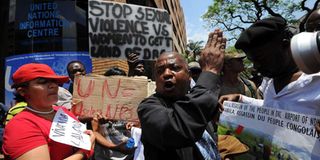Global number of women in peacekeeping missions low

Congolese demonstrators stage a protest in 2012, in Pretoria, South Africa against UN peacekeeping troops in Goma, for not protecting women and children against the M23 rebels. Women are often the victims of conflict and female peace keepers would provide sensible support.
What you need to know:
- Number of women in peacekeeping missions globally remains low despite the adoption of resolution 1325 by the United Nations Security Council.
- Resolution was prompted by realization that in every conflict, women and children suffer disproportionately, especially where rape is used as a weapon of warfare.
- From one per cent women participation in AU/UN peacekeeping missions in 1993, the number of women soldiers and police officers involved in these missions is still significantly low.
- In 2018, a good number of women soldiers in Malawi missed out on peace keeping missions due to a requirement demanding that they know how to drive four-wheeled vehicles.
The number of women involved in peacekeeping missions globally remains low despite the adoption of resolution 1325 by the United Nations Security Council 20 years ago.
The resolution was meant to increase women’s participation in peace keeping across the globe to complement efforts to end conflict and promote peace in warring countries.
This was prompted by the realization that in every conflict, women and children suffer disproportionately, especially where rape is used as a weapon of warfare.
The involvement of women meant a reduction in sexual exploitation, abuse by peace keeping troops and greater likelihood of women reporting sexual and gender-based violence.
However, statistics show that the numbers are yet to reach the desired impact.
From one per cent number of women recorded as participants in AU/UN peacekeeping missions in 1993, the number of women soldiers and police officers involved in these missions is still significantly low.
Dr Sally Wangamati, the gender advisor to the British Peace Support Team-Africa (a delivery mechanism for the UK’s Ministry of Defence that builds capabilities for the African troops deployed to both UN and AU peacekeeping missions), notes that the number of women in all AU and UN peacekeeping missions worldwide, has grown to only 4.7 per cent for the military troops, 10.8 per cent for police officers and 22 per cent for civilians.
“The UN’s 2020 target was to have women in peacekeeping missions at 10 per cent military and 10 per cent police but as you can see, we are far from reaching that target,” she notes.
This is mainly attributed to the deployment criteria used to recruit men and women, that result in the under recruitment of women soldiers.
“These are the forces that contribute women to the missions, so if a force does not have sufficient women, how do we expect it to contribute more women?” she wonders.
Dr Wangamati notes that in 2018, a good number of women soldiers in Malawi missed out on peace keeping missions due to a requirement demanding that they know how to drive four-wheeled vehicles.
“We encourage forces to adopt sustainable reforms that encourage more women peacekeepers not to favour them, but provide fair opportunities to both men and women,” she says.
In his remark at a UN Security Council open debate on Women, Peace and Security last week, America’s Permanent Representative to the UN Ambassador Kelly Craft, noted that in an environment where women are often the victims of conflict and bear the burden of providing for families broken by fighting, women peace keepers provide empathy and sensible support to the people they serve to build resilience and recover from violence.
“When we increase the number of women peacekeepers, we also see improved performance, fewer incidents of sexual exploitation and abuse by peace keeping troops, and a greater likelihood of women coming forward to report sexual and gender-based violence,” noted the Ambassador.
Currently, troops deployed to Congo by international organizations and private relief agencies as part of the Ebola response have been widely accused of engaging in sexual exploitation and abuse.
“We are following this matter closely and expect the necessary and appropriate steps to be taken to address the situation,” said Ambassador Craft.
Ordinarily, soldiers found guilty of exploiting natives of the host country are handed to their respective countries for criminal prosecution but in the event an entire troop is involved, the contingent gets withdrawn from the mission.
Other than recruitment challenges, women who want to join peace keeping efforts face limitations like family obligations, unfavourable working conditions and traditions.
“For example, a young mother wishing to take up such a deployment may struggle finding someone to leave her child with."
"Another may find some facilities lacking in the missions as some say they were designed for use by men, yet another wishing to be in the frontline may find it hard to cope with ‘less risky’ tasks assigned to her as a way of being ‘protected’ by colleagues who see her as ‘vulnerable,” adds Dr Wangamati.





